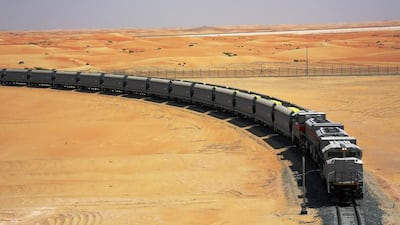Etihad Rail, the developer and operator of the UAE's national rail network, yesterday confirmed it has suspended the tendering process for the second stage of the project.
The announcement comes a week after it said it would cut jobs, citing operations efficiencies.
“The company has suspended the current stage two tender process while it reviews the most appropriate options for the timing and delivery of this phase of the project,” Etihad Rail said.
“This decision will have no impact on stage one operations and all bidders have today been informed [of the suspension] in writing.”
Etihad Rail, which is developing the country’s Dh40 billion, 1,200-kilometre rail network, has completed the 266km first stage. So far, 4 million tonnes of sulphur from Shah and Habshan has been taken by train to the port of Ruwais on behalf of Abu Dhabi National Oil Company (Adnoc) for export.
The 628km second stage is intended to link Khalifa Port and Jebel Ali ports to the Saudi border at Ghweifat and the Omani border at Al Ain.
In October, contractors had resubmitted bids for sections of stage two of the project.
“Etihad Rail is one of the biggest and most complex infrastructure projects ever undertaken in the UAE,” said Nasser Alsowaidi, the chairman of Etihad Rail.
“As we enter 2016, we have been working closely with our partners and stakeholders to assess our strategic priorities for the year.
As a result, a decision has been taken to suspend the tendering process for stage two while we review the most appropriate timing for this investment.”
But with oil prices below US$30 per barrel for the first time in 12 years, governments in the Arabian Gulf are under pressure to rein in spending.
In October, the UAE announced a trimmed Federal budget for this year, and last month Ministry of Finance data showed that government spending fell by 21.6 per cent in the three months to September compared with the same period in 2014.
selgazzar@thenational.ae
Follow The National's Business section on Twitter

